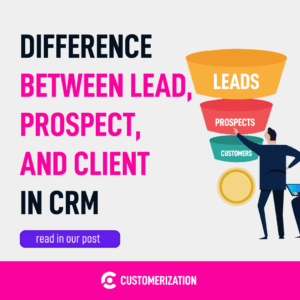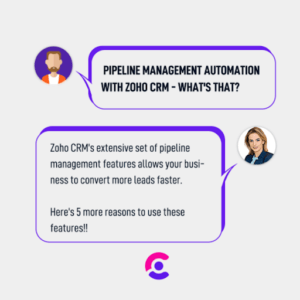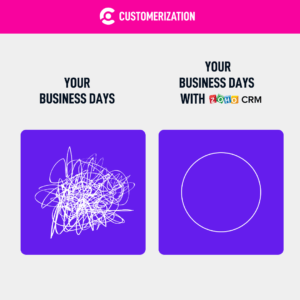Today, integrating digital technology in business is the key to the next-level business growth.
Any business owner will tell you that in order to be successful, you need to invest in the right tools. But with so many options on the market, it can be hard to know which software is right for your business. And once you’ve found the right software, you still need to invest in its implementation.
For small and medium-scale businesses, this can be a significant investment that may not always generate a profit immediately. According to a study by Hartford bank, 82 percent of businesses fail because of bad cash flow situations.
So how can you ensure that you’re investing in the right software for your business?
First, take the time to research your options and find a software that fits your needs. Then, work with a professional to ensure that the software is implemented correctly. By taking these steps, you can avoid bad cash flow situations and set your business up for success.
For those who are looking at Zoho as a viable software alternative, we will answer the big question in this article. Is Zoho worth it?
Let’s understand what this question means. To us, the ‘worthiness’ is determined by the profitability of a decision/ process/ activity for the business’s bottom line.
Profitability is the measure of benefits a business decision will bring compared to an alternative investment. Determining profitability is essential before making any business decision, like implementing Zoho.
The Three Main Advantages of Using Zoho
- Improve revenue and sales margin with Zoho
Zoho has a suite of software that helps businesses with their revenue and sales. The software includes CRM, Marketing, Accounting, Meeting Scheduling, Reporting tools as well as integration with payment gateways, multi-currency support, and sales process automation capabilities.
These features – if implemented right – help increase closing rates, shorten qualification time, identify and action on cross- and up-sale opportunities, and generally move people and companies from leads to loyal customers quicker.
- Reduce operational cost
Zoho software suite helps to reduce operational costs in several ways. One way is by automating tasks that would otherwise be performed manually. For instance, fewer employees can conveniently handle invoicing, project management, and orders processing, eliminating the cost of hiring extra workers.
- Record higher return on investment
The return on investment metric measures the ratio of money gained or lost on an investment relative to the amount invested. With the license cost as low as CAD$50/user/month subscription*, Zoho One provides in-depth and effective solutions in multiple aspects of the business.
Users can maximize their business operations to ensure a much higher return on capital. They can also track customer data, segment customers, create targeted marketing campaigns, and measure the success of marketing efforts.
Bottom line: Zoho One Business Operational Platform helps businesses to record better performance in every aspect of the business from a single investment, improving their market leadership. According to Brad Stone’s book on Amazon and Jeff Bezos, that is the bedrock of profitability.
Conclusion:
Weighing the numerous benefits that Zoho provides, the software suite offers a wide range of applications at a fraction of the cost of traditional on-premise solutions. In addition, Zoho’s pay-as-you-go subscription model allows businesses to scale their use of the software as their needs grow, ensuring that they only pay for what they use.
Now, when we are convinced that Zoho/ Zoho One is the go-to software for your business, let’s analyze the added cost and value of Zoho software implementation.
Is using Zoho expensive and unprofitable?
Here’s how we determine the profitability of any investment, by considering these three “Hs,”: How much does it cost, How will it benefit us, and How long do we wait to reap the benefits?
With excellent strategy, companies using Zoho can shorten the sales cycle, improve closing rates, improve qualification time, and significantly improve installed base sales.
For example, a Zoho client, Rain for Rent, started out by identifying clear goals and specific CRM problems. According to reports from Nucleus Research, they received 600 percent ROI within three months of implementing Zoho.
With Zoho One, they saved over $408,000 annually by cutting out the cost of subscriptions and in-app purchases. The number of invoices went up by over 3.7 percent, and so did productivity.
Workers could find and review clients 10 mins faster than with previous solutions systems, increasing the number of clients they connect to daily.
Within three years of using Zoho CRM, Rain for Rent had an 800 percent increase in net cash flow within three years. Compared to their experience with previous business suits, Zoho One offered less expensive subscription and implementation costs.
Some Zoho CRM benefits responsible for this result were its ease of use, pocket-friendly prices, and quick access to complete business solutions packages.
This case study proves that Zoho One is a profitable and cost-effective business solution. The numerous Zoho CRM advantages far outweigh the investment, making it a top choice for small, medium, and now, small enterprise businesses.
In conclusion, Zoho One is a profitable and cost-effective business solution that offers a wide range of benefits for businesses of all sizes. From its ease of use and pocket-friendly prices, to its quick access to complete business solutions packages, Zoho One provides everything businesses need to improve their bottom line.




